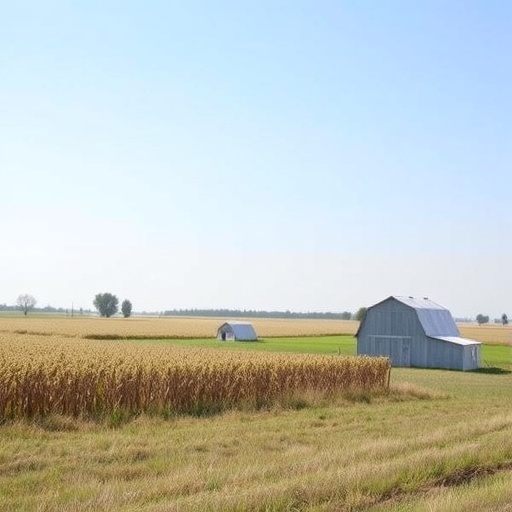As the world grapples with the ongoing implications of the COVID-19 pandemic, a newly published study has shed light on the mental and financial well-being of rural older adults. Conducted by researchers Lee, Neppl, and Diggs, the study appears in the Journal of Adult Development and examines the challenges faced by this demographic during an unprecedented global crisis. Particularly, it explores how pre-pandemic factors and the emotional support provided by spouses can influence the overall well-being of older adults during times of adversity.
The pandemic has drastically altered the fabric of daily life, especially for older adults who may already be vulnerable due to age-related factors. The research team identified key pre-pandemic predictors that could help forecast how individuals fared during the crisis. These predictors included aspects such as social connections, financial stability, and existing mental health conditions. Recognizing these variables is crucial for understanding the resilience exhibited by some and the struggles faced by others.
Social connections emerged as a significant predictor. Prior to the pandemic, older adults who maintained a robust social network reported higher levels of satisfaction and emotional health. This could potentially serve as a buffer against the negative effects of isolation brought on by lockdowns and social distancing measures. In contrast, those who experienced social isolation reported an exacerbation of existing mental health issues, illustrating the profound impact of social ties on emotional well-being.
The study also highlighted financial stability as a critical factor. Many older adults rely on fixed incomes, making them particularly vulnerable to shifts in economic conditions triggered by the pandemic. Job losses and economic uncertainty led to heightened levels of financial anxiety for those in rural areas, where access to resources may already be limited. The results of the study reiterate the need for targeted interventions to support financial security among older adults, particularly in light of unforeseen crises.
Another vital aspect the researchers explored was the role of spousal warmth. Emotional support from a spouse can play a crucial role in buffering against stressors associated with the pandemic. Older adults who described their spouses as warm and supportive reported better mental health outcomes. Conversely, those couples where communication was strained or where emotional support was lacking showed significantly lower levels of well-being. This underscores the importance of nurturing emotional bonds within intimate relationships, especially in challenging times.
The interplay between these variables is complex. The study emphasizes that mental health does not exist in a vacuum; rather, it is influenced by a multitude of factors including social support, financial stress, and relationship dynamics. By analyzing the experiences of rural older adults during the pandemic, the researchers provide a nuanced understanding that can inform future policy decisions.
One of the critical findings of this research is that resilience is not uniform among older adults. Some individuals thrive despite the challenges while others face overwhelming difficulties. Recognizing the predictors of resilience can pave the way for developing targeted interventions that address the unique needs of various subgroups within the older adult population. By doing so, it is possible to create a more supportive environment that fosters well-being during crises.
Additionally, addressing the mental health needs of older adults must go hand in hand with improving financial security. As the study suggests, efforts to enhance mental well-being can only be effective if they are not overshadowed by financial stress. Therefore, the need for comprehensive support systems that include mental health resources as well as financial assistance is paramount.
Looking ahead, the implications of this study extend beyond the immediate context of the pandemic. As societies prepare for future challenges, whether they be health-related or economic, understanding the factors that contribute to resilience in older adults will be invaluable. This knowledge could inform public health initiatives and resource allocation, ensuring that vulnerable populations receive the support they need when it matters most.
The study serves as a wake-up call to policymakers, healthcare providers, and families alike. It highlights the importance of prioritizing mental health resources, fostering social connections, and providing financial support to older adults, especially those living in rural areas. With a commitment to enhancing the well-being of older adults, it is possible to mitigate the adverse effects of crises, ultimately leading to a more resilient society.
The researchers hope that their findings will inspire further exploration into the interplay between mental health, financial security, and social support among older adults. Future studies could expand on this work by examining the long-term effects of the pandemic on aging populations, taking a more granular look at the differences between urban and rural contexts. By continuing to investigate these critical issues, the research community can contribute to a more comprehensive understanding of the challenges faced by older adults.
As authorities continue to respond to the ongoing pandemic and other potential crises, keeping the mental and financial well-being of older adults at the forefront of discussions will be vital. By ensuring that this demographic is not overlooked, societies can build the resilience needed to weather the storms of tomorrow.
In conclusion, the insights gleaned from this study are essential for developing a roadmap that addresses the diverse needs of older adults. Recognizing the multifaceted nature of well-being can lead to better resources and support systems, empowering older adults to navigate challenges with greater ease. As we emerge from the current crisis, let us carry forward the lessons learned and work towards a future in which all older adults can thrive, regardless of their circumstances.
Subject of Research: Mental and Financial Well-Being of Rural Older Adults During Pandemic
Article Title: Rural Older Adult Mental and Financial Well-Being During a Global Pandemic: Pre-Pandemic Predictors and the Moderating Role of Spousal Warmth
Article References:
Lee, J., Neppl, T.K., Diggs, O.N. et al. Rural Older Adult Mental and Financial Well-Being During a Global Pandemic: Pre-Pandemic Predictors and the Moderating Role of Spousal Warmth.
J Adult Dev (2025). https://doi.org/10.1007/s10804-025-09539-5
Image Credits: AI Generated
DOI: 10.1007/s10804-025-09539-5
Keywords: Older Adults, Mental Health, Financial Well-Being, Pandemic, Spousal Support, Resilience, Social Connections, Rural Communities




